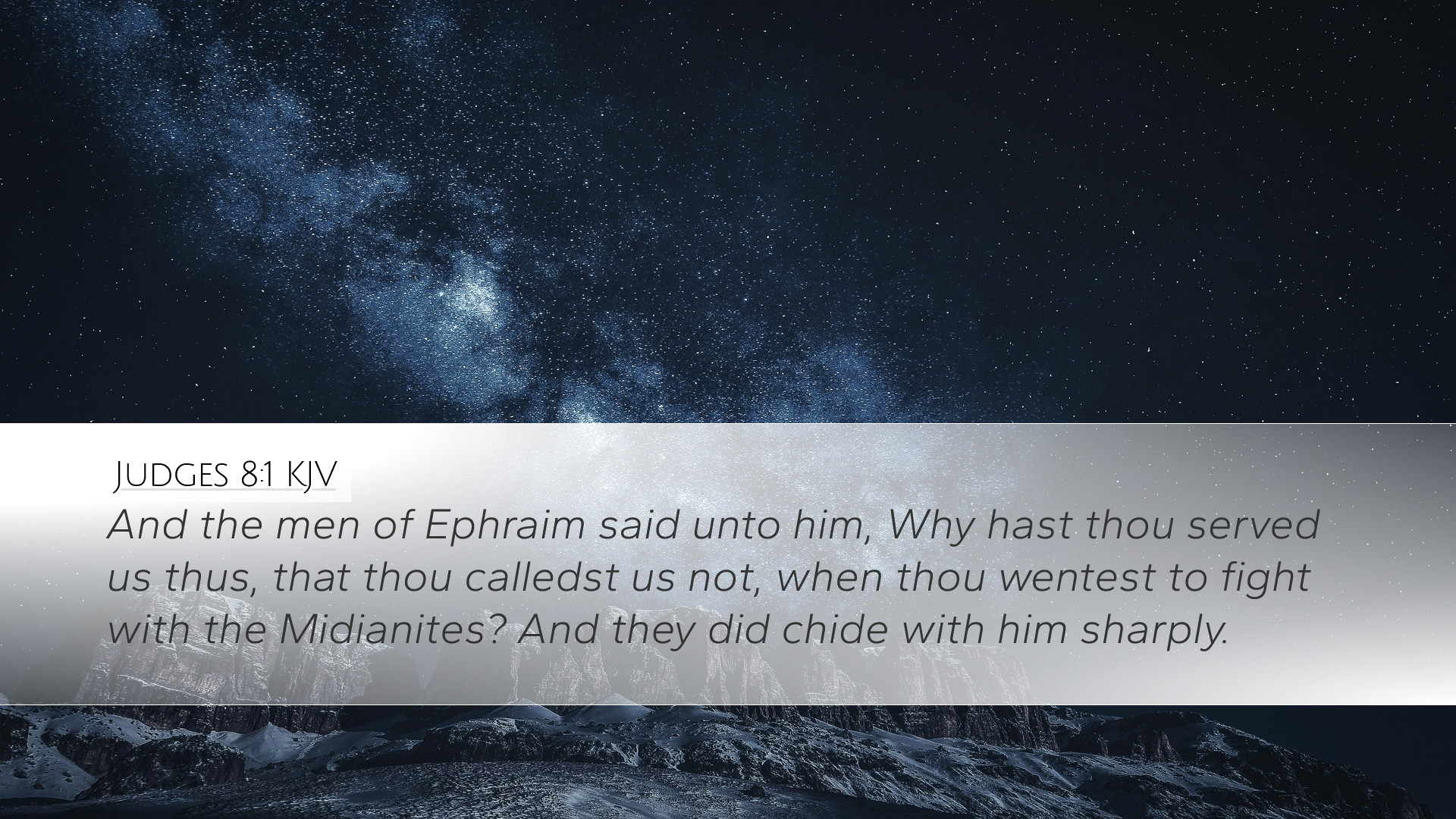Commentary on Judges 8:1
Text of Judges 8:1: "And the men of Ephraim said unto him, Why hast thou served us thus, that thou calledst us not, when thou wentest to fight with the Midianites? And they did chide with him sharply."
Introduction
The narrative in Judges 8:1 emerges from the significant victory of Gideon over the Midianites, a moment of triumph that quickly descends into controversy and conflict within the tribes of Israel, particularly with the tribe of Ephraim. This verse presents deep insights into leadership, tribal dynamics, and the human propensity for jealousy and discord, which are vital themes for pastors, students, and scholars seeking to understand the broader implications of leadership within a community of faith.
1. Contextual Analysis
To comprehend the depth of the conflict presented in this verse, it is essential to consider the context surrounding Gideon’s leadership. Gideon, initially hesitant and obscure, rises to become a deliverer for Israel. His success against formidable foes brings glory and honor, yet it also incites envy among his fellow Israelites, particularly the Ephraimites.
1.1. The Significance of Ephraim
Ephraim was one of the most prominent tribes in Israel, and their grievances reflect a deeper issue of tribal pride and identity. As noted by Matthew Henry, the rebellious tone of the Ephraimites suggests they felt overlooked and excluded from the victory.
2. Exegesis of Key Themes
- Jealousy and Rivalry:
The complaints of the Ephraimites highlight the destructive nature of envy. The perception that they were not called to assist in the battle signifies their feelings of insignificance and a desire for recognition.
- Leadership and Accountability:
Gideon’s response to Ephraim’s accusations becomes a lesson in accountable leadership. Adam Clarke suggests that effective leaders need to maintain a delicate balance between asserting authority and fostering unity within the group.
- The Role of Complaining:
Complaining can disrupt unity and diminish the achievements that God has rendered through His leaders. The Ephraimites’ contention represents a common human tendency to question the motives and actions of those in leadership.
3. Theological Insights
This passage invites deeper theological reflection on several fronts:
- The Sovereignty of God:
God’s choice of Gideon as a leader and His providential success in battle manifest divine sovereignty, which should humble the prideful union of tribes.
- The Nature of Unity:
Gideon's experience challenges contemporary ideas about unity in the church. How often do internal conflicts arise from misunderstanding and pride rather than actual grievances?
- Seeking Peace:
Leadership should strive for peace and reconciliation, highlighting Jesus’ call for unity among His followers as directed in the New Testament.
4. Practical Applications for Today
For modern pastors and church leaders, Judges 8:1 serves as a cautionary tale:
- Recognize Gifts and Contributions:
Ensuring that all gifts within the church are recognized and utilized can help prevent feelings of resentment or exclusion.
- Encourage Open Dialogue:
Creating environments where grievances can be communicated openly and constructively is vital for maintaining unity.
- Modelity humility:
Leaders should exemplify humility in their achievements, reminding the congregation that every victory is through God’s grace.
5. Conclusion
Judges 8:1 is not merely a historical account; it is a profound lesson about human nature, leadership, and the divine call to unity within the body of Christ. Contextualizing this verse within broader biblical themes allows for a richer understanding of the challenges and responsibilities facing leaders today. As both Gideon and Ephraim remind us, the path of service often requires navigating complex interpersonal dynamics while holding steadfast to God's mission.


